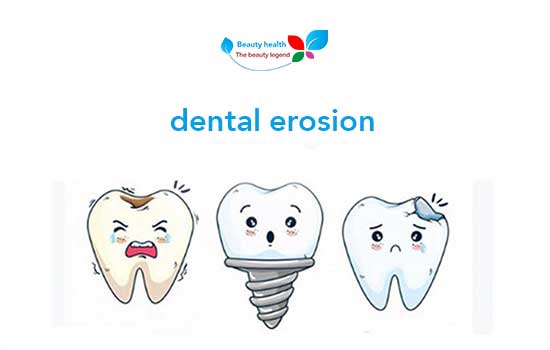dental erosion
dental erosion
Dental erosion is the loss of the surface of your teeth due to the acids you eat or drink, or the acids emitted from your stomach
dental erosion:
Dental erosion is the loss of the surface of your teeth due to the acids you eat or drink, or the acids emitted from your stomach. These acids can dissolve the crystals that make up your teeth, leading to tooth loss. These acids can soften the surface of the teeth, making it easier to eat them through erosion or gnashing of teeth.
What are the factors that lead to erosion of teeth?
Stomach acids may cause tooth decay:
- The stomach contains many strong acids that are used to digest food.
- Vomiting and reflux can also cause stomach acids to enter the mouth.
- Stomach acids are very strong and can cause great damage to the teeth.
- For example, people with bulimia, morning sickness.
Food sources of acid can cause dental erosion:
Many of the things we eat and drink are acidic, one reason being that acidic things taste good. Common foods and drinks that contain high levels of acid include:
- 1- Sugar-free soft drinks.
- 2- Energy drinks.
- 3- Citrus fruits (lemon – orange).
- 4- Kombucha (mushroom tea).
- 5- Drinks or tea flavored with lemon.
- 6- Fruit-flavored lollipops.
- 7- Most juices.
- 8- Vitamin water.
- 9- Vitamin C tablets .
- 10 – vinegar;
- 11- Wine and some types of mixed alcoholic beverages.
Food acids are often added to processed foods and drinks. If you check the ingredients of foods and drinks, you can see if food acids have been added. The ingredients are listed according to their amount in the food, with most of them listed first.
Be careful of food acids 330 (citric acid), 331 (sodium citrate) and 338 (phosphoric acid), which cause great damage to the teeth.
Symptoms of dental erosion:
- One of the signs of dental erosion is the loss of the tooth surface, resulting in a smooth and shiny appearance.
- Tooth erosion can also make any tooth root exposed (dentin), which makes the teeth sensitive to hot, cold or sweet foods and drinks.
- Where there is advanced erosion of the teeth, the enamel may erode to expose the underlying dentin; These areas look like yellow depressions on the surface of the tooth.
- Fillings may begin to appear larger if the surrounding tooth surface fades due to erosion.
Complications of dental erosion:
- Tooth erosion, if not treated, can lead to a gradual loss of the tooth surface.
- Loss of tooth structure can require complex and lengthy dental treatment including fillings, veneers, crowns and possibly root canal treatment.
- When signs of dental erosion are detected, it is very important to “identify and correct the cause.”
Preventing dental erosion:
- Eat a healthy and balanced diet.
- Drink fluoridated water instead of soft drinks or juice.
- Eat fruit instead of drinking fruit juice.
- Eat fruit at mealtimes, not between meals.
- Reduce the number of times you eat or drink anything acidic and reduce the time it spends in your mouth.
- Seek medical treatment when recurring reflux and vomiting .
- Do not chew vitamin C tablets. If you must, take a vitamin C supplement that is swallowed whole.
- Use sugar-free gum after meals to promote saliva flow, saliva is very important to protect your teeth from erosion.
- Consider using dental products that contain tin fluoride. Stannous fluoride is effective in reducing dental wear.
- Rinse the mouth with water or fluoride mouthwash.
- Rinse your mouth with sodium bicarbonate (baking soda) rinse 1 teaspoon of baking soda in a glass of water.
- Consumption of dairy products.
- Use a soft toothbrush with fluoride toothpaste .
- Avoid using whitening toothpastes and toothpastes that contain charcoal.
- Make sure the acids are neutralized before brushing the teeth.
- Wear a specially made dental splint if you grind your teeth while sleeping.
Can saliva help reduce tooth erosion?
- Saliva is the natural and powerful defense against tooth erosion as saliva can wash acids from your mouth into your stomach and can neutralize the acids.
- It can also repair the early stages of tooth softening by repairing dental minerals, however, it cannot restore the missing tooth surface.
- Reduced saliva flow (dry mouth) can also increase the risk of dental erosion.
- Keep the mouth moist as this improves saliva.
- Remember that dehydration can reduce the amount of saliva you make, so drink plenty of fluoridated water.
- If you suffer from persistent dry mouth, you may be at increased risk of dental erosion.
What are the causes of lack of saliva:
- Some medicines can affect the salivary glands and reduce the amount of saliva they can produce, resulting in a dry mouth.
- Working in a dry environment and not rehydrating too often can result in decreased saliva production.
- Excessive intake of caffeine, which is found in coffee, tea, chocolate and cola drinks, can reduce fluid levels in the body.
- The body and reduces saliva Some diseases can affect the work of the salivary glands .
How is the process of treating dental erosion?
- If your teeth are eroded, the missing surface of the tooth may need to be replaced with fillings or crowns.
- It is also important to visit the dentist periodically, determine the cause of tooth erosion, and then work on treating dental erosion.
